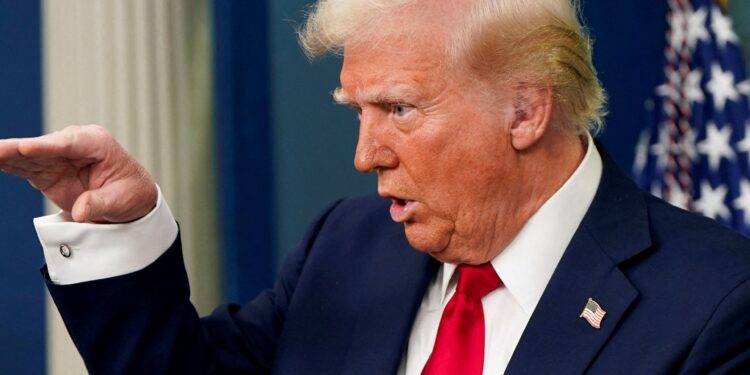US President Donald Trump confirmed his intention to implement his threats to impose customs duties by 25% on imports coming from Canada and Mexico as of February 1, however, it has not yet been decided whether this decision will include oil imports from the two countries, which may affect the form Great energy and living costs in the United States.
New escalation
During his speech in the Oval Office, Trump explained that these measures come to address several cases, including illegal immigration, the smuggling of fentanel, and the trade deficit with Canada and Mexico. It also alluded to future plans to impose customs definitions on Chinese products, noting that China is responsible for the flow of fentanel to the United States, and this has led to hundreds of thousands of deaths due to drug use.
Trump said in his remarks: “China will see itself to pay customs duties because of the fentanel that they send to us, we are in the process of implementing this,” Trump said in his remarks.
Canada and Mexico are preparing to respond
These decisions did not pass without a response, as the Canadian and Mexican governments announced that they would take anti -American fees, while they tried to reassure Washington that they were working to address American concerns about borders and trade.
Canada has offered alternative solutions to avoid entering into a comprehensive trade war, but it seems that the US administration is proceeding with the implementation of its decision without any decline.
Does the decision include oil?
It has not yet been decided whether the oil imported from Canada and Mexico will be subject to these customs duties. This ambiguity raises major concerns among energy experts, as 40% of American oil supplies depend on imports, most of which come from Canada.
In the event that the fees are imposed on oil, this may lead to high fuel and energy costs, and this directly affects the American economy and raises gasoline and transportation prices, and basic commodities.
Economists have warned that this step may contradict the Trump pledge to reduce the costs of living, as companies and consumers are expected to bear the burden of this increase in prices.
The return of the trade war with China?
It seems that Trump’s commercial policies will not be limited to North America, as he renewed his threats to impose additional fees on Chinese products, which may reach 10% in the first stage, while during his previous election campaign he threatened to impose fees of up to 60%.
On the other hand, China has sought to calm the situation, as Deng Chochayang, Chinese Deputy Prime Minister, said during the Davos Economic Forum that Beijing is seeking a solution to “everyone profit”, and also confirmed its desire to expand the size of its imports instead of entering into a new trade war.
Possible repercussions
Customs duties, which are primarily taxes, usually lead to high prices of imported commodities, and this causes consumers towards buying local products to enhance the national economy. However, imposing fees on energy imports may have counterproductive results, as companies and consumers will carry these additional costs, and this leads to high prices in various sectors.
Economic experts believe that these steps may exacerbate inflationary pressures, especially if Canada, Mexico and China respond to the imposition of counterfeit definitions on American exports, and this may lead to disturbances in the financial markets and low investor confidence.
With the approaching date of the implementation of customs definitions, fears are increasing that this step will lead to a global commercial escalation that affects energy prices, financial markets, and the American economy.



